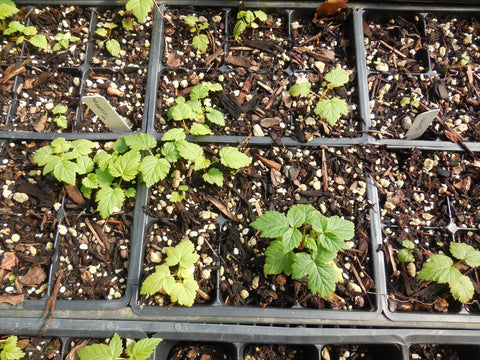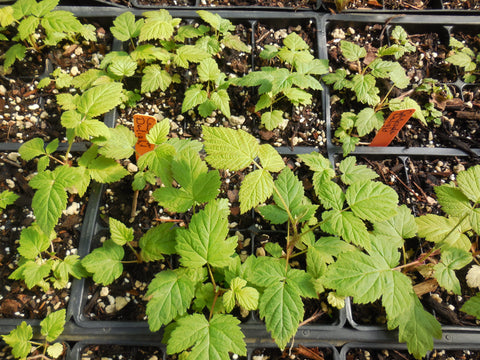Planting Raspberry Root Stock
Planting raspberry root stock is the easiest and most economical way to establish raspberries, no matter if you are planting multiple acre fields or a small backyard patch. One ounce will plant a row 2-1/2 foot in length. One 8 oz. order will plant a 20 foot row…16oz. will plant a 40 foot row. This is the preferred method for raspberry farmers because of the lower cost and the ease of planting. You can expect 24-36 new canes on average to grow from 8 oz. of root stock the first year. If you care for your new raspberries properly, you will get more canes to grow... and if you neglect the planting you will get less new canes or complete failure. This is true no matter what you choose to plant... root stock, bare root canes, or plants.
All it takes is a little patience and remembering to water regularly. Planting raspberry root stock is different than planting seeds. First buds need to form on the roots and grow to break through the soil. This can take from 4 to 9 weeks for the new canes to appear. If there are small canes or buds on the root stock, point them upright when planting. The shallower you plant the root stock and the lighter/fluffier the soil covering the root stock, the more canes you will get to grow. It is important that the root stock does not dry out before or after you plant or they will die.

Also if the roots of raspberry plants are waterlogged, they will root rot and do poorly. So it is a compromise...if you are planting in the field/garden you will usually cover the root stock with 1/2 to 1 inch of soil so you do not need to water as often. If you are planting in a more controlled environment in containers, or with automatic water systems, covering with only 1/4 or 1/2 inch of soil will produce more canes. If you cover the root stock deeper than 1 inch, canes will be slower to develop. Planting as deep as 3 inches can result in total failure. If your soil forms a hard crust when it dries, cover the root sock with a mix of equal parts peat, fine bark, perlite, soil, and compost. Choose a watering method that waters all of the soil in your row. Drip systems work well for established raspberry plants, but do not work for newly planted root stock.

Root stock produces more canes than bare root raspberry canes at less than half of the cost. Let's compare cost. Root stock will cost from 90 cents to $2 per foot planted. Bare root canes planted 2 foot apart will cost $3.00 to $4 per foot planted. And young plants planted 2 foot apart will cost $4 to $5 per foot planted. Mature 1 gallon plants will cost $6 to $9 per foot planted. All of the above are for retail pricing. Bare root canes and plants are the most common source of plant material to obtain because retailers do not have the equipment to store root stock properly.
Root stock is also an easier way to start raspberry plants than tissue culture. It has the benefits of starting with certified disease and virus free stock just like tissue culture, but it is quicker to get plants ready for field planting than with tissue culture. Cost is a lot less too.
An added benefit of planting root stock is the flexibility of planting in difficult conditions. If your soil is too wet or cold to till in the early spring, you have several choices. You can prepare your soil the previous fall, adding 10-20% compost and tilling. Or if you have an area of good garden soil since you do not need to dig any holes to plant root stock, you do not need to till before you plant. Simply lay out the root stock like a thin rope and cover with a good well draining loose soil. Do not plant when you are expecting heavy rains, or the roots may rot before they start to grow.

Or, if your weather is too cold, you can get a head start on the season by planting the root stock in containers, covering 1/4 to 1/2 inch deep to root out before they are planted in their permanent location. Cut roots into sections 2-3 inches long. Potting soil needs 30% pumice, course sand, fine pea gravel in 3/8- 1/16 inch size. Do not use Big Box Store potting soil brands, as it is too wet and will root rot and kill young plants.
Place the containers in a sunny warm location. Root stock grows quickest if your temps are 50-90 degrees. Do not plant if your temps are below 28 degrees. Usually in about 3-5 months after you planted the containers, the young plants have rooted enough to pull the entire root ball out of the container intact and are ready to plant in the permanent garden area. Do not bare root the plants or they will suffer from shock.
Root stock, bare root canes, or young plants will all produce berries just as quick. The only difference is that root stock will produce a thicker stand the first year, and thus a bigger berry yield quicker. Scenic Hill Farm Nursery provides root stock, bare root canes, and potted plants.
And remember, raspberry plants are heavy feeders, so you need to fertilize. Any balanced fertilizer will work if planting in the ground. In containers only use low salt fertilizers meant for container growing.
Click Here to view all raspberry root stock we have available!
Patented varieties are sold for fruit production only, Propagation is prohibited.
Scenic Hill Farm Nursery, 2820 NW Scenic Drive, Albany, OR 97321, 541-990-6099
www.scenichillfarmnursery.com © 2022 Scenic Hill Farm
